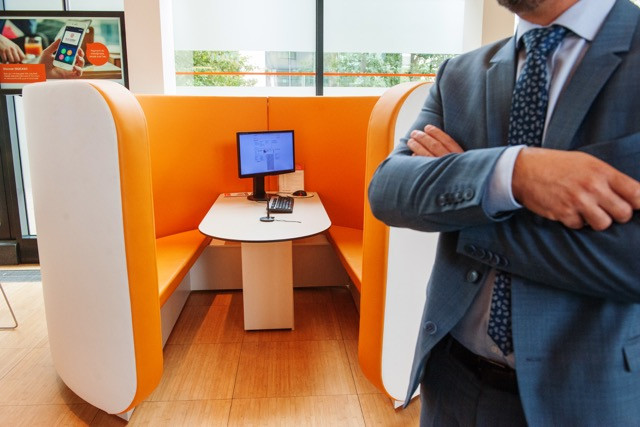According to Andrea Rossi, the branch manager, the answer is simple: “everyone needs a bank.” While we might do our financial transactions online (increasingly by mobile), we are still reassured to see bricks and mortar, concrete and glass. Maybe this gives the impression that our money is physically safe somewhere, rather than just sitting in an anonymous database.
Young and old
“Younger customers, particularly those aged 18 to 24, make the greatest use of branches,” noted a recent report, “Transforming the banking branch”, by the consultants Accenture. Even if millennials might say they want to do everything online: “research shows that this age group has a noticeably greater... need for face‑to‑face contact, advice and reassurance in the initial stages of their own financial journey.”
Rossi said the branch’s main day-to-day business is opening accounts, issuing credit and debit cards, and arranging home rental guarantees. They also arrange housing loans, give investment advice, and work with small- and medium-sized businesses. Located near the Kirchberg hospital, the branch serves roughly 4,700 individual clients and 300 enterprises. Seven people work there, a standard number for a branch of this size.
Light, welcoming
The atmosphere is redolent of a trendy bar or café. Big windows give an airy feel and there are plenty of chairs, a coffee machine, and shelves of ING branded bottled water. A C-shaped sofa surrounds a table equipped with a PC that clients can use. The teller staff look more like receptionists.
The private side of an ATM is seen in the back office of the ING bank branch in Kirchberg, 12 September 2017, Image: LaLa La Photo
Robbery is clearly not the worry they used to be. Gone are the bullet-proof glass screens between staff and clients that used to be standard decades ago. Advisors are on hand for those seeking financial advice: just knock on one of their open office doors.
The three hours around lunch are the busiest times of the 9-to-5 day. Rossi said they have experimented with staying open later, but this changed little. He doesn’t know why, but Thursday is the busiest of the five days they are open.
Only about 10-15 relatively old people visit to make payments or make withdrawals in the traditional way: face-to-face with a bank teller. “A lot of work has gone into helping all our clients get online, and this has been mostly successful,” Rossi noted. “This work continues, but we expect to still be serving some clients in the old way for some time to come,” he added. The vast majority of clients, however, prefer to make all their withdrawals and deposits via ATM.
Not all online
Even when it comes to more sophisticated transactions, most of this is now done remotely. Investment funds and pension products are described online, and are integrated into tools that help clients model their investment strategy. For loans and bank guarantees much of the preparatory work can be done remotely, with documents collected using email.
No longer do bank managers have to look clients in the eye when considering whether to grant a loan. These checks are now all data driven, based on credit ratings. Only at the end of the process do clients come in to sign contracts.
Andrea Rossi, ING Kirchberg branch manager, speaks with Delano on 12 September 2017. Image: LaLa La Photo
“Compared to other countries, Luxembourg’s tax system is quite easy to understand, so there is little need for advice,” Rossi noted. Nevertheless, many clients do have relatively complex questions, particularly if they are thinking of leaving Luxembourg, or they are non-resident commuters. Many prefer face-to-face meetings to work through these questions.
However, for wealthiest clients (with wealth in excess of €1m) are referred to ING’s newly-opened HQ opposite the central train station.
A few decades ago, even village bank branches would have a strong room protected with metal bars where they would store bundles of notes, coin, precious metals and safety deposit boxes. No longer. We looked into a side room with its reinforced metal door, and there was a small safe containing a few papers, the technical boxes behind ATMs, a lonely fax machine, and the stock of ING bottled water.
Credit institutions are finding life tough these days due to low interest rates and high regulatory costs. But that Luxembourg’s high street banks have kept more or less the same number of outlets suggests they understand the importance of showing a human face.


